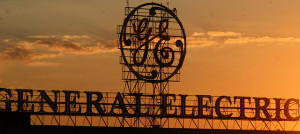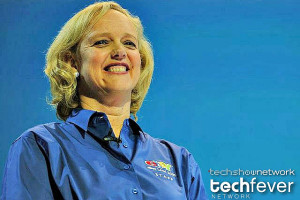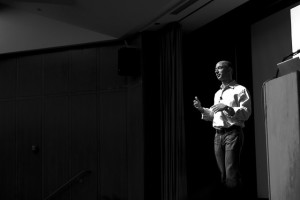By Peter Ward September 18, 2015
GE Moves Jobs Out of U.S.
General Electric will expand its operations in Europe, Brazil and Canada, as the company moves jobs away from the U.S.

General Electric ©Matthew Bradley
GE has blamed the move on the U.S. government’s failure to reauthorize the U.S. Import-Export Bank. Congress allowed the EXIM’s charter to lapse in June, and GE says it needs export credit agency financing from the agency as it bids on $11 billion worth of international projects.
Without the financing, the company says it risks losing contracts for turbines, power projects and other industrial equipment. GE has started talks with several non-U.S. foreign export credit agencies and has begun moving jobs out of the U.S.
On Tuesday the company announced it plans to move 500 jobs from the U.S. to Europe and China as a direct result of the lack of EXIM financing. GE, which is the U.S.’ largest industrial conglomerate, also plans to create a development center for turboprop engines in Europe, investing $400 million and creating 500-1,000 jobs.
Rick Kennedy, a spokesman for GE Aviation, explained that GE would be a competitive disadvantage in the turboprop business if it stayed in the U.S., as its rival Pratt & Whitney Canada, a division of United Technologies, can provide government-backed credit assistance to its customers from Canada.
World’s Biggest Brewers to Merge?

Beer ©Thomas Hawk
The two biggest brewers in the world are in talks to join forces, in what would be the largest beer merger ever, according to reports on Wednesday.
Anheuser-Busch InBev has made an acquisition offer for SABMiller, in a deal that could create a combined company with a market valuation of $230 billion, based on Tuesday’s share prices. AB InBev owns beer brands such as Budweiser, Corona and Stella Artois, while SABMiller owns Peroni and Grolsch. SABMiller also owns a 58% stake in Molson Coors, which produces Miller Lite, Coors Lite and Blue Moon.
The BBC reports that if the merger were successful, the combined company would supply a third of the world’s beer. But the success of the acquisition is very much in the balance, as the deal will face intense scrutiny over anti-trust issues. It is very likely SABMiller would have to relinquish its stake in Molson Coors to appease U.S. antitrust regulators, and the agreement would also have to be passed by regulators around the world.
The larger brands of beers have struggled recently in European and North American markers, as consumers have moved towards wine and craft beer. SABMiller’s shares have fallen 11% in the past 12 months, making it more vulnerable to a takeover bid. The drop in demand has also prompted major brewers to look for ways to create growth.
HP Cuts More Jobs

Hewlett Packard CEO Meg Whitman ©TechShowNetwork
Hewlett-Packard, the struggling computer company, announced on Tuesday it will cut about 33,000 jobs over the next three years.
CEO Meg Whitman previously announced 55,000 job losses earlier this year, and the latest cut represents roughly 10% of the company’s workforce. HP remains the third largest employer in the technology industry, but revenue and number of employees have declined considerably over the past three years, as consumers moved towards mobile devices such as tablets and smartphones, sapping demand for HP’s laptops and desktop computers.
Meanwhile, the company’s products for businesses have been hit by rivals such as Amazon, which offer enterprises the same information technology services but delivered via the internet – seen as a more efficient solution than the packaged software and hardware of HP. The enterprise side of the business has lost $4 billion in revenue since 2011.
HP’s response to the decline is to cut the company in two, a move which will be completed in November. One of the new entities, Hewlett Packard Enterprise, will sell high end technology to businesses, while HP Inc. will deal in personal computers and printers for consumers.
Up to 30,000 of the cuts will be in the Hewlett Packard Enterprise business, with 3,000 being axed in HP Inc.
Bezos Going Into Space, via Florida

Amazon.com CEO Jeff Bezos at Startup School. ©ptufts
Amazon CEO and founder Jeff Bezos is taking his space exploration company Blue Origin to Florida, where it will manufacture, test and launch rockets.
“We’re not just going to launch here, we’re building here,” Bezos said at a press conference at Cape Canaveral today.
Bezos will invest more than $200 million into the project, which aims to utilize reusable rockets for private space flight. The company will first launch rockets from Cape Canaveral Air Force Station, before building its own facility in time.
Blue Origin was founded by Bezos in 2000, but the company has been largely quiet until recently. The company announced an agreement to build rocket engines for United Launch Alliance a year ago, and launched an experimental spacecraft, called New Shepard, earlier this year.
Bezos is not the first billionaire to aim for space – Elon Musk, Richard Branson and Paul Allen have all made forays into the spaceflight industry. Musk’s SpaceX aims to help colonize Mars, Branson’s Virgin Galactic targets aspiring space tourists, and Paul Allen helped fund SpaceShipOne, a space vehicle that managed to get to space and back twice within five days.
Europe to Asia Internet Cable Interactive
Fusion ran an interactive article on Monday explaining how climate change is helping a project to connect London to Tokyo directly via fiber optic cable.
The story first runs through the history of connecting the world via cables, with a graphic showing the first submarine cable in 1854 and eventually the plans for the new cable, which will run 9,600 miles between the U.K. and Japan. When connected, it will take 154 milliseconds for data to reach either side.
Authors Simon Ducroquet and Julian Reyes then explain the link to climate change: As the world’s oceans get hotter and more acidic, remote parts of the world such as the Arctic Circle become more accessible. Another interactive shows the diminishing ice in the Arctic, which is allowing Toronto-based Arctic Fibre to take on the project. The basic backbone of the cable will be completed by 2016 and will cost around $620 million.
This is worthwhile, say Ducroquet and Reyes, because having a faster link between Europe and Asia enables faster stock market transactions, which can bring competitive advantages. Canadians and Alaskans will also benefit, as they will have access to faster internet connections where they previously relied on unpredictable and slow satellite connections.
The final graphic of the story describes the process of submerging the cable and making the project operational. The risks of the project are also highlighted, as the cable can potentially be damaged by volcanoes, ship anchors, icebergs and even submarines.
This entry was posted on Friday, September 18th, 2015 at 1:34 pm. It is filed under Week in Review and tagged with beer merger, Blue Origin, fiber optic cable, General Electric jobs, Hewlett Packard jobs, Jeff Bezos, space exploration, U.S. Import Export Bank. You can follow any responses to this entry through the RSS 2.0 feed.
Comments are closed.
